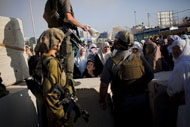It seems that the Palestinian Authority under President Mahmoud Abbas is creeping closer and closer to accepting direct talks with Israel. According to Fateh Central Committee member Azzam Al Ahmad on August 13, the PA's decision, "will be determined by what we will hear from the US administration after we demanded more clarity about its activities and the way they deal with the international Quartet’s statement." Within two days, the decision will be made public.
President Abbas, who has been under tremendous pressure by the United States, Israel and the Europeans to enter into direct negotiations with Israel said on August 9 that he would agree to move to direct talks as long as they were based on a March 19 statement by the Quartet, which called on Israel to halt settlement construction in the West Bank and reach a full peace agreement with the Palestinians within 24 months; one that would result in a state on the basis of "borders that existed before the 1967 War."
However, two days later, on August 11, Israeli Prime Minister Benjamin Netanyahu refused the offer, saying he was only willing to enter into direct talks without "preconditions."
"What we demanded are not preconditions as Israel tries to show. What we demand are basic requirements to the peace process, previously agreed on by interested parties," Al-Ahmad retorted.
The pressure was also apparently on Netanyahu as well. On August 12, US Secretary of State Hillary Clinton phoned the Israeli Prime Minister to discuss "issues" that were blocking direct peace talks with the Palestinians.
However, if Abbas does decide to begin direct talks with Israel, it is certainly not because Israel has made any positive gestures towards the Palestinians. On the first Friday of Ramadan on August 13, Israeli authorities banned scores of West Bank Muslim Palestinians from reaching Jerusalem to perform Friday prayers at Al Aqsa Mosque. Only men over 50 were allowed to cross Israeli checkpoints without permits as were women above 45. Thousands of Palestinians waited hours at checkpoints to be allowed to cross but were turned back by Israeli border guards. Inside the city, Israel deployed 4,000 soldiers and policemen outside the Old City and at the gates of the Aqsa, to quell what Israel described as possible "disturbances."
Also on August 13, Israeli forces demolished five shops in Qalqilya, according to local eyewitnesses. Tahseen Mansour, the owner, said he never received notification from Israeli authorities to remove the shops' contents before they were demolished.
In Tulkarm on August 8, Israeli authorities handed 14 demolition orders to homeowners in addition to a military order to level a soccer field in the village of Faroun.
On August 10, Israeli authorities bulldozed an additional 200 graves in the Ma'man Allah cemetery in Jerusalem under the claim that the graves were there "illegally." Over the past few months, Israel has dug up hundreds of Muslim tombstones in the cemetery to make way for the construction of a Museum of Tolerance in its place.
More destruction came on August 10 when a 100-plus Israeli police force entered the Bedouin village Al Arakeeb and demolished makeshift tents the residents had erected following the initial destruction of their village last month. Israel justified the demolition by saying the village was unrecognized, thus leaving hundreds of families homeless.
On August 12, PA economy minister Hasan Abu Libdeh vowed to continue the government's campaign to boycott settlement projects. The comment came after a meeting with Israeli industry and trade minister Benjamin Ben Eliezer, who voiced his government's request to the Palestinians to end the boycott.
Abu Libdeh was also quoted as saying that Israel's repeated request to end the boycott is proof of its success and that it has influenced the faltering of the settlement enterprise's economic power. Ben-Eliezer, on his part, said his country took the Palestinian decision very seriously, saying it was also damaging to the Palestinians. "The boycott must be lifted immediately because of the fact that many businesses in Judea and Samaria employ a large number of Palestinians." Prime Minister Salam Fayyad, who initiated the campaign at the start of the year, says he has put in place a system that would compensate Palestinians working in settlements by offering them alternative job opportunities in the Palestinian territories.
Meanwhile, the plan for Silwan's Al Bustan neighborhood continues unhindered. On August 8, west Jerusalem Mayor Nir Barkat said his municipality was continuing in its plans to transform Al Bustan into a tourist site by demolishing another 20 Palestinian homes. In an interview with Al Quds newspaper, Barkat said the municipality planned to build 50,000 new housing units in the city with a ratio of 1:3 between Arabs and Jews respectfully.
Finally, on August 9, Libyan authorities released an Israeli citizen arrested in Libya last March for filming Jewish archeological sites for a Jewish agency. According to the Libyans, the two sides came to a deal for the man's release after Israel agreed to allow the building of 1,250 houses in the Gaza Strip via UNRWA and with Libyan funding.







